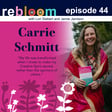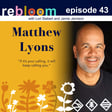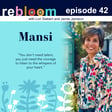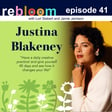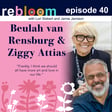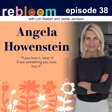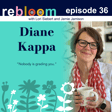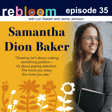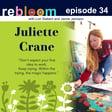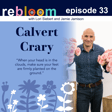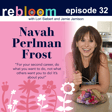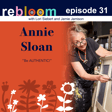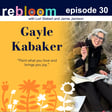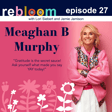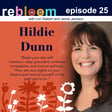Introduction to 'Rebloom' Podcast
00:00:01
Speaker
Hey everyone, welcome to Rebloom, the podcast where we explore the power of change, rediscovery, and living with intention. That's right. We're your hosts, Lori and Jamie, two friends who really love a good story about transformation.
00:00:16
Speaker
In each podcast, we're going to chat with inspiring guests who've made bold pivots in their lives or careers. They've let go of what no longer serve them to embrace something more authentic, joyful, and true to who they really are.
00:00:31
Speaker
And the best part, many of them reconnect with passions or dreams they discovered as kids. It's about finding the seeds planted long ago and letting them bloom again.
00:00:43
Speaker
So if you're ready for real conversations about reinvention, purpose, and following your creative heart, you're in the right place. Let's dive in and see what it takes to re-bloom.
Who is Denise Graves Montgomery?
00:00:56
Speaker
So Jamie, a couple of months ago when we were talking, you were telling me that you had the most beautiful person renting downstairs from you.
00:01:08
Speaker
Denise. And i i didn't realize how incredibly beautiful this person was until I saw her in person. When you see her, she lights up.
00:01:21
Speaker
And when you watch her teach, it's it's the most inspirational talk I've heard in a very long time. Watching her inspire her students is magical.
00:01:33
Speaker
I'm taking so much away from that morning session as well as our chat today. Yeah. um Listeners, you are in for the most amazing conversation. i am blessed, blessed, blessed to have a summer house guest, Denise Graves Montgomery.
00:01:50
Speaker
She is beautiful in heart and spirit, inside and out. Her voice is incredible, but more than that, she amazing. helping future generations and connecting them and teaching with them and inspiring them so that opera and their beautiful talents will carry on.
00:02:13
Speaker
And this is just a beautiful conversation and we hope that you will enjoy it. It's a special one. Our first together, our first live, our first live. And we thank you all for joining us and please have a great listen and please take a look at Denise Graves Foundation and all her beautiful work.
00:02:33
Speaker
Well, hey, Lori, how are you? oh my God, Jamie, I'm here live in Chautauqua with you. We are live and guess who we're welcoming?
Denise's Masterclass and Career Pivot
00:02:42
Speaker
Hello, Denise Graves Montgomery. How are you today?
00:02:46
Speaker
Thrilled to be here with you fabulous gals. Oh my gosh. Okay, well, for our listeners. Wait, can I say one thing first? Yes. We just came from masterclass that Denise gave and it blew our minds. yeah So to be sitting here and learning more about her I just can't wait for this conversation. This conversation is going to blow everybody away. um Denise is a mezzo soprano. She is an Emmy award-winning Grammy award-winning singer.
00:03:16
Speaker
ah She has incredible resume, including being on Sesame street. So I mean, from the Metropolitan Museum or from the Met, from the met excuse me, in New York,
00:03:29
Speaker
to singing for presidents, to Elmo. I mean, come on, it's just everything and anything. And she's had a fabulous career, but like many of our guests is beginning a pivot and giving a change. And she is also reblooming.
00:03:44
Speaker
And Denise, thank you and welcome to our podcast. Oh, it's been a joy being here in Chautauqua. And the best part has been getting to know you, Jamie. Thank you for your welcome and your warmth and your effervescence.
00:03:58
Speaker
And you just are love. You just are love itself. She is. She's the host with the most. She's been treating us like princesses this week. yeah So for everybody, we are in Chautauqua, New York. We're in Chautauqua Institution, where Denise is here all summer.
00:04:16
Speaker
and she is um and She's helping the opera here. We have a beautiful opera. Lori is here for her first time visiting. Yeah, because I'm hoping to teach here, possibly. Possibly. Or do a residency. We'll see. Once you're here, never want to leave. Chautauqua is like being in a Hallmark movie or on a movie set. You're in fairyland. There's dollhouses.
00:04:42
Speaker
I've never been in a place like it. It's incredible. And so for us, this is a really fun first experience that we actually get to do this live. um Denise is my beautiful summer guest this year. And in yeah we have learned so much. I have learned so much about opera and it has just been.
00:04:59
Speaker
an amazing experience. And so let's get started. So Denise, go ahead.
Denise's Musical Upbringing
00:05:03
Speaker
Lori loves us this question. always have to ask this, as you know, if you listen, um i always want to know about Denise as a little girl.
00:05:11
Speaker
What was she like? Did she love music? Was that from early on? I did. um and loved to music. Music was always in our home. um I grew up in a very religious household. My father was a minister.
00:05:26
Speaker
um My mother was very, very strict. too um We were not allowed to listen to anything outside of gospel music, so that's all we heard, except for some strange reason.
00:05:37
Speaker
a Perry Como album ended up there and we had listened all gospel and Perry. Exceptions for Perry. That's right. There was that. Um, but as a little girl, I was extremely shy.
00:05:52
Speaker
Um, extremely withdrawn and to myself, my brother and my sister were, um'm one of three in my family. ah My brother and my sister were sort of the hip ones, you know, the very popular ones in our neighborhood. i was the kid that got picked on all the time. I was the one got bullied all the time. same Yeah.
00:06:12
Speaker
And, um you know, I was the one who was in the corner reading or listening to music. And um and that's the kind of I was very much withdrawn and into my in my so in myself ah as a little kid. And you're a middle child. I am. I'm a middle child. is that Yeah. And everything you're saying, I can so relate to. Yeah.
00:06:32
Speaker
It's really interesting that you went from that shy little girl to. Oh. what you've done with your life. yeah So what turned things around? Did start singing in church? I did. you When did you recognize that you had a gift from God? Because you have a very special gift from God. um Thank you for saying that. So two things. My my family had a singing group.
00:06:56
Speaker
Okay. Because parents... What is that? Okay, so my parents um divorced early on and we were mostly raised by my mom. And um because my mother worked three jobs to support us kids, she organized our time after school. So we were sort of the original latchkey kids. We'd have to let ourselves out to go to school, walk to school and come back home. But because she didn't want...
00:07:20
Speaker
us to have a lot of idle time on our own, she would organize our activities for after school. So she designated each night of the week for something. So Monday night was book report night and she, and this was work we had to do for her. So she'd say, okay, Denise,
00:07:37
Speaker
Today you have to, she got the Britannica encyclopedias, remember? she you're gonna read these, you're gonna read them. And so she would give us these book reports. she that um Once I had to do blue jays, you know or or flowers or certain kinds of things. And she would assign that, and Monday night was that.
00:07:53
Speaker
um Tuesday night was sewing night. So she taught us how to sew. And my sister and I would make clothes for our dolls. yeah And like, we're you wouldn't do wouldn't ever do this now, but we would repair the holes in our jeans.
00:08:06
Speaker
Oh, you would do that now. You'd sell them for a lot money. It's called upcycling. That's a thing. Upcycling, right, right. Yeah, yeah, yeah. But a lot of kids want their whole, their own music. And th Thursday night was music night.
00:08:19
Speaker
And so she got us that little Casio keyboard and we used to tinker around, we didn't know were doing. And we used to make up these little songs and on Saturday we would sing them for her. And so she said, we got kind of good making up those little songs. She's like, you guys sound great. She said, it's shame that nobody hears you. we should sing that in church.
00:08:39
Speaker
So we'd make up these little songs and sometimes we sing little hymns and stuff and then we would sing them on church. So we had a name. We were called the inspirational children of God. And that's who we were. And so on Sunday mornings, we would go to go and sing, you know, at the offertory or whatever it was. Now my brother, has a beautiful voice, my sister too, but my brother has a really beautiful voice, sang all the solos. I was the kid that was always in the back.
00:09:06
Speaker
behind my mom's skirt, you know? And one Sunday, my brother said he he was sick. And my mother said, well, Denise, you'll have to sing the solo. And I said, I can't possibly do that. There's no way I can do that.
00:09:19
Speaker
So you have to do it. And I don't know if you've ever been to a Baptist church, but when you're standing up there in front of the church, you love a Baptist church, right? I do love a Baptist church. They, they encourage you yeah and you know, and you've got that's right. And there's nowhere to run, nowhere to hide. yeah And so that became my first audience. And so I'm,
00:09:40
Speaker
you know my So my mother didn't know, or maybe she did know did what she was creating. I did it. did it and i did it How did you feel? Do you remember how you felt? was still scared and I was still very nervous. And you know it took a long time still, but that was the breaking of the ice.
00:09:55
Speaker
Yeah. Right. right and and And seeing the positive response from the congregation. So. so Fast forward. Well, did your mom, did your mom, so your mom encouraged the music? and so She did. And so she she encouraged you to go to school with music So, no. so that's another story. That's an important story that parallel to my mom. that yeah There were a lot of sort of guiding forces and angels in my life steering me on this path.
00:10:25
Speaker
um I was this really
Influential Educators in Denise's Life
00:10:27
Speaker
shy kid. right And i the first day of school, I just cried and I cried and I didn't want to be separated from my mother. And I cried the whole time until this woman, Judith Grove, who's still alive,
00:10:39
Speaker
um started playing the piano and singing. And then I loved to go to school. So I would go to school and she would sit at this piano and play and sing. And I just thought she was amazing.
00:10:51
Speaker
um And so that was kindergarten through sixth grade. And every once while, she'd give me like a little solo to sing, a couple of measures or something like that. When it was time to graduate there and go to junior high school, I went to this new experimental school without walls.
00:11:05
Speaker
called the Friendship um Junior High School. I'm walking down the hall one day. i run into her. Unbeknownst to both of us, she transferred from the elementary school there. I said, oh, my goodness, what are you doing here? Oh, my goodness, what are you doing here? Blah, blah, blah.
00:11:17
Speaker
So she said, you know, Denise, you like singing. And ah here in Washington, i grew up in Washington, D.C., We have what's called all city chorus. And so they gather all the kids from all the four quadrants and they form one choir.
00:11:30
Speaker
um And then we do concerts at Constitution Hall, that sort of thing. She'd come pick me up on Saturdays from my house, take me to rehearsal, stay with me, get me a little sandwich or whatever, and bring me back home. What an angel. Exactly. so But then listen to what happened. Listen what happened.
00:11:46
Speaker
So it's time to graduate junior high school. And she said, where are going to go for high school? And I said, I don't know. And she said, well, you know, you've got a pretty voice. And there's a performing arts high school in Washington called the Duke Ellington School of the Performing Arts. I think you should audition.
00:12:00
Speaker
So she got the application. we filled it out together. um i did the audition. i got accepted. And she became the principal of the school. Oh, no. So that was truly, i I mean, truly my guardian angel. This woman who set me on this path and guided me until I could start taking ah voice lessons formally and that sort of thing. and And then discover opera and classical music and all these other genres that I i wasn't allowed to hear. Right. Yeah.
00:12:33
Speaker
And then this whole new world opened up to me. When did you discover opera? Oh, yeah, was 13. 13. Yeah. was 13. 13. It feels like a natural segue from gospel singing to opera to me for some reason.
00:12:47
Speaker
I don't know why. Yeah. Because gospel is big. It's passionate. It's big. Oh, I what you see. And it's passion. Yeah. I see what you see. Yeah. Yeah. Yeah, true. But to answer the question of when did I know, i was singing um one of the great 24 Italian songs in arias. I was singing a song called Nina.
00:13:05
Speaker
And there was this guy in the school, Kelvin Page, and he was super popular. Everybody knew him. And he was he was an upperclassman. And I sang on a student recital and he came up to me in front of everybody. And he said, oh, my God, like,
00:13:20
Speaker
ah who would have known that you had this voice? Because I was still a little shy kid. He said, i didn where did you come from? You know, like who knew that you, but he said that in front of everybody. And then I said, okay, okay.
00:13:36
Speaker
Right. Look at me. Yeah. No more shy. So yeah you leave the Duke Ellington School and they obviously um see some talent. And where do you head for college? and when Well, before that, I went
How Did Germany Influence Denise?
00:13:50
Speaker
Oh, I went to I went to live with a German family. um My German teacher, Gisela Severino, who is an Italian name, um discovered that I had a really good ear.
00:14:02
Speaker
She said, Denise, you've got a really good ear and you've got a good ear for language. And I picked up language very quickly. So she said, there's an exchange program that she had just left the gymnasium in Germany in and Munich.
00:14:13
Speaker
And she was so it wasn't a ah one of the big formal ones that they have now. It was just one that she wanted to start with, um you know, her colleagues in ah in Germany.
00:14:24
Speaker
And so I went to Germany. And I stayed with it and lived with a German family. And that was amazing. I mean, that was amazing. How long was that? Six months. I mean, that was that was incredible. I mean, it changed my life.
00:14:36
Speaker
wow Wow. And so after that, I decided. and And my German host dad was an organist. He was a classical organist. And so they were big lovers and supporters of the opera. And I was in the i was in the opera like, you know, all the time.
00:14:52
Speaker
Very often. During that period. During that period. Yeah, we went to. I pick up German. Yeah, sure. pick up German. Come back to the States. I come back to the States. I decided I graduated early. finished high school early.
00:15:02
Speaker
And I decided um to go to Oberlin College. Yes. Wow. In Ohio. we're In Ohio. That's right. Same. I'm from Ohio. Is that right? Yeah. Yeah. And
Mentorship at Oberlin College
00:15:12
Speaker
so I went there. And when I was there, I was asking the kids. When I came as a prospective student, I was asking the people,
00:15:19
Speaker
Who is the hot voice teacher? Who's the one that everybody wants to study with? And they told me this name, Helen Houghton. They said, but it's very hard to get into her studio. So this was back in the day. I wrote her a letter. I wrote her a letter and said that I was a prospective student. I was very interested in coming to Oberlin.
00:15:36
Speaker
And would she accept me in her studio? And she said she had to hear me first and all those things. She accepted me. I got into the really good voice teachers studio and she was super, super, super strict. She was from the old school and she believed that you had to dress up for your lessons. She made the girls wear dresses and or skirts and put yourself together and because she said, this is your profession.
00:15:59
Speaker
And you have to care about this. You have to care about what it is you do. And I don't want you walking in here with just like a T-shirt on and like ripped up jeans or whatever it was. You have to show some respect for what it is that you're doing and that you're learning. And so she made us dress up and prepare for those lessons.
00:16:17
Speaker
So that's interesting because when we were sitting in on your masterclass this morning, one of the very first things you said to the first student was because he was a little on the shy side and you said, you sing the moment you enter a room and you have that three minutes to make an impression on what you're all about with people and that i'm that's gonna stick with me forever.
First Impressions Matter
00:16:41
Speaker
it it it It stuck with me and it was interesting as a speech teacher too. He came in and he was shy and he was crying. I couldn't hear anything he said. We were kind of sitting in the middle towards the back and I thought, I don't know what this young man said.
00:16:54
Speaker
And Denise, you said, you know, come in almost own the ah own the room from the minute you walk in. And this is, you are singing, you are part of this. And the more he went, the more he practiced with you and he he was scared, but he did it.
00:17:07
Speaker
it It changed, and it changed the way he stood. It changed his posture. His demeanor. He was moving on, shaking on the piano. And then he moved away from it, and he started to sing in a bigger way. And you could hear it in his voice because he he kind of came out of himself. It was amazing. Thank you for noticing all those details. Thank you so much. the other thing I loved...
00:17:30
Speaker
And I learned so much and about teaching while watching you. I loved how you were you were not easy on them. You were tough, but you always had a pat positive thing to say. And often you would grab their hand and support them. it was really beautiful.
00:17:47
Speaker
I think it's important because it's so exposed. I mean, what we do is so vulnerable. And then you do that in a public forum like that. You examine and take their voices apart. and um And singing in front of your peers is just the worst. People are listening with real critical ears. And yes it's hard. It's not easy thing to get up there and do.
00:18:06
Speaker
and they all did an amazing job and your kindness as a teacher which kind of wants me to i almost want to pivot from your career which is long and beautiful but one of the things that i've learned from you and from the others that are with you this summer is that ah singer a career there's a longevity because your voice is a muscle much like an athlete and i Never knew that. And so even as a singer with God-given talent and the things that you've done, you've been on TV, you've sung it, I mean, everywhere, every major opera house, it's you're just incredible. um
00:18:46
Speaker
But you need to think about Those pivots. And you you are a teacher. So can you tell us a little bit about some of the other things that you started to think about and and so in your career? My voice teacher, Helen Houghtam, who was a voice teacher at Oberlin College, she did something which ah she gave us so much. And andnna I see every day still as a woman in my 60s.
00:19:09
Speaker
all that she poured into us. I mean, sometimes it just comes out and I think, oh, that was her, or that was her voice, or that was her one of her gifts. So one of the things that she did, she didn't allow us to practice on our own because she said you can practice in bad habits,
Discovering a Passion for Teaching
00:19:24
Speaker
right? So she would assign an upperclassman for, so when we wanted to practice, she would assign an upperclassman, somebody in our studio,
00:19:33
Speaker
who was um working with her technique to observe our practicing, to say, oh no, here you need to make sure that you expand your rib cage, or here you need to make sure that your diaphragm descends, or here you need to make sure that you lift your palate, or whatever whatever it was.
00:19:50
Speaker
So she did that. She would assign that. So when I got to be an upperclassman, younger um classmates were assigned to me. So I was good at it.
00:20:02
Speaker
And people started asking for me. They'd say, I want Denise to do it. ah And she'd say, really? And they'd say, yeah, she's really good. I like the way she explains it. So who knew that she was not only giving me a life as a singer, but also as an educator? Right. Yes. that's And that was one of her amazing gifts. So i I was always parallel to my career, also in the business of developing and really examining voices too. Yes. yes And that was a gift to from her. It's beautiful. And just having watched you teach because... And it it's you were giving these students very critical feedback, but it was helping them to grow as performers. And it wasn't bashing them, but it it was serious and it was sincere, but it was constructive and they embraced it. and But I also loved the things that you could hear and you could find, I mean, obviously it's a long career that you could hear those beautiful nuances and help them, but you could tell that they just took, and they knew what you were i mean, they took it and did it and
00:21:04
Speaker
nailed it when I mean, it it was amazing to watch. And that's exciting to to see. Yes. When you see on their faces the dawning of that understanding. Yeah.
00:21:15
Speaker
That is a... got That is so gratifying. It is. I mean, I never thought, I think in this profession, you have to be incredibly myopic and just really focused on your own development.
00:21:27
Speaker
and i'm And I have said this often that I never thought I had enough room to be concerned with somebody else's path. But I have gotten as much, if not more, satisfaction yes from watching the success of my students than anything that's happened in my own career. Do you feel, because I feel this way, I'm also in my 60s, and I feel like at this part of my career, I'm I too love watching those aha moments when I'm teaching art retreats, when someone's painting something and they're frustrated or whatever, and then you just coax them a little bit and then they surprise themselves with what they create. Yeah. Yeah. it's like ah there's nothing better than watching that.
00:22:12
Speaker
And I also love watching how each student expresses themselves and figuring out the things that light them up. And much like what you were so encouraging them today, they each have their individual style and way of performing and making it them and telling the story. And yeah, I think i think maybe when you get to this part in your journey of life,
00:22:37
Speaker
you've done all these other things. At least I feel this way that you were competing and it was maybe ego driven. And now at this phase, it's more about giving back and being in service. And i agree.
00:22:52
Speaker
Yeah, I agree. And I think it seemed that what the foundation is leaning towards these days. yeah But it was, it it wasn't contrived for me at all. It was a natural, it felt like a natural process.
00:23:05
Speaker
progression and a natural involvement in my whole trajectory. Yeah. Yeah. Yeah. I mean, it's been one of the greatest gifts to my life has been working with them. And they feel, you you know, they're here in this space with me now. They feel like my children. It's going to make me cry. Yeah.
00:23:25
Speaker
none They're pretty, they're pretty. Well, I think with, it'll make me cry. Cause I, you know, as I was watching you and you were, you were, talking about their voices, but you were trying to pull out their soul.
00:23:39
Speaker
Wow. Like each one of them were unique. And you were saying to them, I need to hear you. an artist can, draw every artist, we can all draw sunflowers and do it, but what makes you, you, and you were telling them like, yes, here's the, here's how you fine tune this, make this go up. But what you were, you were really trying to get from them is give me your soul, give me who you are, be in the moment.
00:24:05
Speaker
That's what I took away from that masterclass. And it was amazing. And they did it. They did it. They did it. They got it. They were thinking technically, I think, but really what you were saying is give me you I want you to be here. That's beautiful. That is very touching.
00:24:21
Speaker
And particularly in a refined art form like classical music that's so surrounded with a lot of tradition, a lot of convention, yeah people are afraid to, ah we have a lot to sort of live up to, right? And there are lots of, in in some ways, constriction around, you know, there's a proper way to do it, right? Right, right. um And so,
00:24:48
Speaker
People don't know, as particularly young developing singers, that the thing that makes it uniquely beautiful
00:24:59
Speaker
It's their souls, their unique yes stories that nobody else has. you know We can all sing the same aria, but it's going to come through the lens of your experience, which is going to pass through your intellect over your heart, which is going to make that a very different interpretation from yours.
00:25:19
Speaker
Right. And the thing that you have to lean into is your individuality. That's the thing that is going to make the difference. yes Right. your Your joys, your pains, all of it. And bring it bring it forward in your art. And that's what you were encouraging them to do. And it was beautiful to watch. Thank you. And that young man said that his grandmother, his father, yeah his father had just passed right before coming here. he was thinking of that. Yeah.
00:25:44
Speaker
And so bringing all of that. bringing that forward. And that's a real, and you, and he, you could tell Even when he said that, he kind of held back. you could He's still guarded. It's still hard for him, like I could tell. but But yet if he can, when he's growing, in nature but that's the teaching. And that's what Laurie, Laurie and I are both teachers.
00:26:05
Speaker
And to hurt to your point, we love we love watching that light just light up in ah in a student and watch them just begin to shine. And there's greater gift.
00:26:17
Speaker
Let's take a quick minute and thank our amazing sponsors. Our podcast is proudly brought to you today by Jet Creative and Urban Stems. Jet Creative is a women-owned marketing firm committed to community and empowerment since 2013.
00:26:33
Speaker
Are you ready to re-bloom and build a website or start a podcast? Visit jetcreative.com backslash podcast to kickstart your journey. They will help you bloom in ways you never imagined.
00:26:48
Speaker
And bonus, our listeners get an exclusive discount when you mention Rebloom. And a huge thanks to Urban Stems, your go-to and our go-to source for fresh, gorgeous bouquets and gifts delivered coast to coast.
00:27:03
Speaker
Use Bloom Big 20 and save 20% on your next order. And don't forget to subscribe to this podcast and follow us on Instagram and Facebook at Rebloom Podcast.
00:27:16
Speaker
Thanks to our sponsors and thanks to you for joining us today.
00:27:22
Speaker
So since we're a Rebloom and we talk about pivoting, i know that you are in the midst of ah a pivot and you have some new things happening.
What Led to the Foundation's Creation?
00:27:31
Speaker
Can you talk about those? Oh, quite a lot.
00:27:34
Speaker
ah Well, I would say that the teaching has been parallel to the career. So I see that as... So it's not a big pivot. It's just... trump Not from the teaching piece of it. I would say the leadership part of it.
00:27:46
Speaker
is a part of a rebloom and the creation of the foundation is 100% part of a reblooming. Absolutely. It was a dream I didn't know that I had, but it that was also born out of my concern for my young people, for my um my students. and the responsibility that we have to not just sit at the piano, and and I don't mean to say just in any sort of diminutive way, but um to teach them how to sing well, but also to prepare them for a changing field.
00:28:21
Speaker
And I was really concerned with what happens when they leave this studio? What's the next step? You know, we can work on perfecting all of those things here, but if they can't manage and cope when they get out, have we, we failed them then. Right. And so, and, and what I was hearing from a lot of my young people were, but you know, this, the, the, the world changes quickly anyway, because of technology and everything.
00:28:47
Speaker
And from the time that I started out and embarked on ah career, it's, I don't even recognize it as the same industry. It's completely different. Yeah.
00:28:57
Speaker
yeah And the things that they have to face are completely different. You know, just as the young people, our own children have grown up in this world with nine eleven with COVID, with all these school shootings, with all these things that have happened. it's ah They've had to grow around a lot of heavy things.
00:29:19
Speaker
things that have shaped them and that will continue to shape them differently. Right. You know, right they will one of the things that's so beautiful about Chautauqua is seeing the kids. Yeah. Right. yeah yeah On the little school bus, riding their tricycles and bicycles around. Yeah.
00:29:35
Speaker
And they can do that. Yes. Freely. And that's what we want. We all, I mean, childhood is so short. It's so brief. Yes. It's so brief. And then it sets up the rest of your life. Like all the things that happened in those short years right will affect the individual that you become. And you want them to have those those yeah years of just freedom and just, you know, so that's really, really beautiful.
00:30:00
Speaker
And it's also beautiful too, even, and this is such a special place, but there's so many events and things that happen outdoors. So even if the kids aren't going to the symphony or the opera, they're maybe walking past and they're hearing it. It's actually, they're not sitting in front of a screen.
00:30:15
Speaker
They're riding their bike past and they're like, wait a minute, what is that music? So they may not tap into it initially, but they're exposed to it and they see it all around. That's right. They're living amazing. Yeah. Much like what your mother did for you when you were a child. So I'm going to share that with my daughter. You need to have.
00:30:33
Speaker
A writing knife for the board. I've taught my grandson to crochet, but I think all wonderful of those other things that are not related to a screen are so important. But back to your foundation. okay that's because Because that started in twenty help us to know how that came about I think it was coming about. i mean, it sort of got its legs and its structure in 2020. I think we've been setting it up for a while.
00:31:01
Speaker
I think that my my my students have been crafting it around me ah when I look at... some of the gaps of vulnerability that are that exist now in the industry, they would come in and tell me things. For example, I had this one student who was beautiful in every way, beautiful girl, beautiful singer, beautiful student.
00:31:26
Speaker
She had gotten to her, she was doing her masters. She'd gotten to her second semester as a master's student and she had not ever been chosen um to be in the opera program. And I was furious and I thought,
00:31:41
Speaker
You mean to tell me going to graduate and we're calling that she is a master. We're saying she's a master at doing this and she's never done it. Wow. I was so furious. yeah yeah And I called down to the opera department. I said, you're giving something to my kid if we have to make it up.
00:31:58
Speaker
We're going to do something. There is no, we have a responsibility to her, to her parents, to the education that we are giving her. We cannot have her graduate saying, calling her a master and she's never been on the stage. Oh my gosh. Exactly. That's ridiculous.
00:32:12
Speaker
I was furious, but sometimes you've got to get angry got it yeah you in order for the change. Yeah. yeah see get So what did you, see, and we talked about obviously music changing over the course of your career, what began to present itself to you with these young students that you said, I need to create foundation. Because lot people are like, oh, I'm going to create foundation. This is the Denise Graves Foundation for our listeners. And tell us what what you saw And the roots of that and how you. Well, first of all, I said, we're not going to stand around and hope that somebody gives
Creating Opportunities in Opera
00:32:42
Speaker
Good. We're not going to be starving artists. We're not going to sit around praying and hoping that we give an opportunity. We're going to create those opportunities ourselves. You have some agency over what happens to you in your life.
00:32:55
Speaker
And it's we're going to take the bull by the horns yeah and we're going to create our own opportunities. And here's what we're going to do. And so it started like that. But then there were some other things that happened. That was sort of the spark.
00:33:06
Speaker
yeah that got me thinking differently about the work that I was doing in the lives of these young people. I started thinking differently about it. Like I have a bigger responsibility than not only teaching them how to to to craft their instruments, but I have to prepare them in so in such a way um that they can get out into this world and do something with their lives. And the first thing is to know that they have some say over what happens in their lives. That's the first thing, that's number one, and we're gonna craft this thing together. So that was the first thing that happened.
00:33:39
Speaker
The other thing that happened that really caused, well, I said the other thing, there were about three, it was a perfect storm of yeah a few things. That was one event. okay The next event, was I had a student who was singing outside of what was formerly known as the National Negro Opera Company in Pittsburgh. OK, so this was during the pandemic.
00:33:58
Speaker
And um I saw it ah on Instagram. I said, I called and said, what are you doing? She said, oh, there's this the woman named Mary Cardwell Dawson who started this opera house for black people. What was that?
00:34:09
Speaker
Mary Caldwell Dawson went to the New England Conservatory. She graduated in 1925. In 1925, as a black woman, she was not going be cast in the leading roles on the world's opera houses. So her response was like I was telling my students, well, then I'll create my own opera house.
00:34:25
Speaker
And we were talking earlier about the HBCUs and the need for the HBCUs at a time when black people were not allowed to go to the other universities. The response was, let's create our own university. So that's what she did. She said, I'm going to create my own opera company.
00:34:41
Speaker
So she created this opera company called the National Negro Opera Company. First of its kind. Longest running, most successful, and run by woman, which was which was which was huge in that time for a woman to be running her own and to be successful. She had chapters in Chicago, in Detroit, New York, New Jersey, Washington, D.C., Baltimore, and Pittsburgh, where she have that has the house. Anyway, I saw the students singing there. The house was dilapidated, falling down, columns missing, windows out, ah roof collapse, all these things.
00:35:12
Speaker
So this was during COVID. So I got in touch with my students and I said, okay, This is what we're going to do. Everybody's at home right now. The theaters are closed. Here's what we're going to do. going to do a project and everybody's going to sing an aria and online. and we're going to upload it with the hashtag save the national opera house. And we're going to bring attention to this opera house that this woman created. That's collapsing. She built it for us. We should rebuild that. yeah so here I know. Isn't it fabulous? So it it started out.
00:35:39
Speaker
That's how it started. And then people started seeing like, what are you guys doing? I hear your students like, what is this thing? What are you talking about? Then the other prong to that was I started this online cooking show,
Connecting Through Cooking and Legacy Discussions
00:35:52
Speaker
right? Called Cooking with Denise, um because that's one of the things that I love to cook.
00:35:56
Speaker
um One of the things I love to do with my students is sometimes have them ah or over at our farmhouse and go with an opportunity to go through the material, run through their arias, run through their audition material, that sort of thing.
00:36:08
Speaker
And then afterwards, I would cook. So I try to create that online because my kids, meaning my students, would. Everybody was home. The singers were considered to be the super spreaders. All the theaters were shut down.
00:36:20
Speaker
And I was checking in with my students thinking, what what are you doing and how are you doing and and what's going to be our next move? So we all have to eat, right? So I try to create that online, go into their kitchens and while they're making dinner and just talk.
00:36:34
Speaker
What are you doing? What did you do today? What are your plans for tomorrow? how are you going to do? And so while I was doing that cooking show, which was online, I was talking about this woman. Did you guys ever hear about this woman named Mary Caldwell Dawson? who that started started out That started it. And people were saying, what are you talking about? And who is this woman? And blah, blah, blah, blah. blah And while I was doing the cooking show, the foundation was getting stood up. where yeah It asked to be here. yeah It asked to be born. And so it was formed with my students, with Simone, who's here with us in this space right now. It was formed with my students on Zoom talking about we should do something about this house yeah that's in Pittsburgh. We've got to do something to help rebuild this house.
00:37:16
Speaker
We have a responsibility to what this woman gave, her sacrifice of what that was all those many, many years ago so that we can be on the stage doing this work. we We have a responsibility to what she gave to us and what she gave to the world.
00:37:30
Speaker
And that's how was born. So it's about bringing into so the foundation is ah is is centered around social justice, American history and the classical
Foundation's Cultural Mission
00:37:40
Speaker
vocal arts. Right. And it's about bringing into rightful prominence those great um individuals who have contributed to our cultural fabric, but have been left out of the telling of the American story.
00:37:51
Speaker
So that's and we've got three programs and they're all they all have the name Voices and and we have one that's called Shared Voices and that's the HBCU, the Historically Black Colleges and Universities that we um partner with conservatory. So oftentimes HBCUs have a great tradition of you've heard of maybe the Fisk Jubilee Singers of having this great, great chorus.
00:38:15
Speaker
choirs and glee clubs and some of the greatest voices that we've ever heard have come from HBCUs. If you look at the voice of, ah well, Robert McFerrin, who's the dad of Bobby McFerrin. Yes. yeah's in He was an opera singer. oh So after Marian Anderson um made her, she was the first black opera singer to make her debut at the Metropolitan Opera.
00:38:34
Speaker
Right after her debut was Robert McFerrin, Bobby McFerrin's dad. wow yeah Yeah. And so, so that's another voice. A great singer by the name of Jesse Norman was another one. ah ah Amazing singer by the name of Liantine Price was another one.
00:38:50
Speaker
These are household names, incredible giants and titans in the industry who got started at HBCUs, right? And so we take those those talented individuals and we pair that with the rigor and the training that is often found in conservatories.
00:39:07
Speaker
to train those wonderful voices and help nurture and um and and guide and teach and mentor those young developing artists. And make the connections for them that maybe are not afforded to them. Absolutely. Absolutely. Going the channel that they are. Absolutely. 100%. Yeah, that's exactly right. I love the idea of creating opportunity. And I think some people are...
00:39:28
Speaker
they think they have this whole, they have to have this big, perfect plan to do anything. And sometimes it just evolves out of starting something and you don't know where it's going to take you. You're exactly right. That's exactly I've heard so many people say, just don't, don't think about it. If you want to write, just write something now. Exactly. Just start, just start. Cause it's never good. If we wait for it to be all the little pieces are in place. Welcome to our podcast. Yeah. Exactly. Yeah, we started when we had no idea what we were doing. Yeah, exactly. My husband goes, you guys are getting better. We were really rough in the beginning. But, you know, we hadn't, first all, we were new friends, but we had never done it. mean, podcasts are relatively new for most people, but people are like, just do it.
00:40:14
Speaker
And we are having the best time, but it's also helping. It's connecting. it's It's educating. It's doing all the things that we believe in, and it's growing. And that's what you're doing for these amazing young students, too. which And seeing this helping them to see successes.
00:40:29
Speaker
right. And find their way to the big opera houses and the connections. and and Because it's changed. Everything's changed. Oh, yeah. and And helping them to navigate this new experience. That's right.
00:40:40
Speaker
Wow. And to also discover what lies underneath that, you know, nobody starts out being a ah big opera singer. It starts out with just a voice.
Significance of Performing Post-9/11
00:40:50
Speaker
Yeah. And then to watch that voice bloom.
00:40:53
Speaker
Right. And to grow into. so It's an amazing thing to behold. Which is your story. You just started out a shy little girl behind your mama's back. and That's right. And look at you now. So.
00:41:03
Speaker
i was I told Jamie I wanted to ask this question just because I'm curious. She's always curious always curious. She's my curious friend. Yeah. yeah um So we we did talk about the foundation, which that was our focus, but you've had this long, incredible career.
00:41:19
Speaker
Are there one or two things that stand out that were just, I know you have a million, but are other there one or two things that you've done that just, they're the most beautiful experiences you've had?
00:41:32
Speaker
Oh, many. Well, i know. Many, many. mean, I've been incredibly- It's a big question. When she asked you that question, where did you go first? The first thing I thought about was my singing at the National Cathedral after 9-11. I read that. That's the first thing I thought about. We thought that. Yeah. And you know what was in my mind? No, this is embarrassing.
00:41:49
Speaker
know No. embarrassing. No. Dish. Dish. Come on, When I was a little girl, I was certain I was going to marry Michael Jackson.
00:42:03
Speaker
I knew it. And when I was singing that concert, I thought, I wonder if Michael Jackson is watching. ah You know he is. I mean, that. no I love that.
00:42:16
Speaker
What an honor to be asked to do that. And what an emotional experience all in one. um We'll also name drop because it's pretty impressive. She was, you were friends with Ruth Bader Ginsburg. Oh, yes.
00:42:29
Speaker
I mean, what was she like? Amazing. yeah And one of my students is here with us now. And we and she she loved the opera. Yes, she did. She spoke here too. She spoke at Chitaubra. did she really? did, yes she She would often be a super, you know an extra in the in the opera. And so she loved- Oh, really? Oh, yeah. Oh, I love that. She did it several times. Oh my gosh, I love that. And so she, I don't know if I was doing something, but she met with my students twice.
00:42:57
Speaker
to just speak with them and about performing. And yeah so to answer the question of what she was like, incredibly generous, yeah warm, very soft-spoken. However, she was a tiny little, you know, teacup. She could have used your um teaching. They might tear up good because she's tiny.
00:43:17
Speaker
She is tiny. And you've got to lean in. She's really soft-spoken. But she could also be salty. Yeah, she was something. i mean, she was really amazing. so So her and amazing people. I mean, at that at that performance at the National Cathedral, you know all the presidents presidents were there. Ford and Carter and Clinton and the Bushes. And i i sang for President Ford's funeral. Wow. ah And i was I've been singing for the presidents since um President ah Carter.
00:43:52
Speaker
Wow. yeah So I sung for wow all of them. And I love the fact that you did so much with PBS and for children. And so your teaching started, I mean, through your career, you've made that a part. And because opera is a different, I mean, a lot of people are not exposed to it. But by part exposing so many young people to opera, which helps to educate them, which helps to bring opera into everybody's heart and home. And the little kids are c incredibly responsive.
00:44:27
Speaker
Yeah, they love it. They love it. They love
Outreach with Houston Grand Opera
00:44:29
Speaker
it. When I was doing my apprenticeship with Houston Grand Opera, so oftentimes what happens, um ah you know, after you're finished with your education, we have what's called young artist programs. And so opera companies will ah engage people a young artist to do secondary roles, maybe the chorus, that sort of thing. So you have a contract with that company for two or three years.
00:44:50
Speaker
I did that with Houston Grand Opera and and they would send me out on these educational outreach of risk of exposing opera to the general public. yeah They sent me to kindergartners all the time. Yeah.
00:45:01
Speaker
Yeah. Junior high school kids. And the response was always amazing. It's a question of, education, and but exposure. And that's the beauty of Chautauqua. i'm I'm actually looking at it right now. There's a wonderful picture that we love of my husband and his brother because they were in Labo M as kids.
00:45:19
Speaker
They were the extras as the kids. And um it's one of our favorite pictures because it's just a fun picture. But that's the beauty of this space. And we're so blessed to have you here this summer and introduce so many more people to opera and children and continue this this mission of yours with the with the foundation. And um so tell us the foundation is the hidden voices and the shared voices. And um ah we're doing, they're doing Boheme this season, by the way. Oh, okay. Your husband will have to go. you will. Yeah, that's right. I don't think he'll fit in the car. He won't fit in the car. But we have three programs, Shared Voices, that's the HBCU, the Historically Black Colleges and Universities, and Conservatory Exchange Program.
00:46:04
Speaker
Shared Voices, that's Shared Voices. Hidden Voices is about creating works of art that tell the story of some of those ah left out or forgotten, you know, artists.
00:46:16
Speaker
At the time of Mozart, at the time of Bach, Schubert Schumann, There were women yeah who were, you know, composing alongside them. There were LGBTQ people composing right alongside them. There were black people, men and women composing alongside them, but we didn't learn about their works.
00:46:34
Speaker
So it's about creating works. They never got the credit. They never got the credit. The recognition. And some of these stories have been amazing triumph. You know, we we don't know anything about. so so So that program um celebrates that and creates works of art that tell those stories. So whether that's a play, whether it's an opera, um whether those are books, whether those are documentaries. I think we shared one of the calendars with you. Yes.
00:47:00
Speaker
um note cards. We find all sorts of ways to tell those stories. We are in conversations now with Kwame Alexander about doing children, who is running the literary department here at Chautauqua, about doing children's books, about partnering with with with the foundation to do children's books and those sort of things. So that's hidden voices. And then generational voices is about ah Emerging artists, those who, the shared voices are the are the collegiate level, the generational voices are older students who are have finished with their formal training, who have not yet embarked on a career.
00:47:40
Speaker
And so that bridge that happens, that foundation is that bridge of mentoring and shaping and preparing to launch those careers so that we don't.
00:47:51
Speaker
Because in this profession, we have agents, but we don't have what Mary Cardwell Dawson was, was also an impresario. And that's someone who is looking and ah over the whole shape of the career.
00:48:05
Speaker
and Someone who says, not now. Let's not do that now. Let's sing for this company. ah Let's sing for this conductor. ah You know, ah don't wear that dress. ah Let's work on these languages, that sort of thing. The agents book you. right And that's if you're lucky. They will book you, but there's no one who's guiding the career that says yes to this and no to that. And a lot of times you have to say no, but in the beginning, you know, when you're first getting out, the first thing you need to do is pay back your student loans often. And so people take all kinds of jobs or perhaps they accept, um, work that's not exactly right for their development right then and there. And sometimes we can hear of these great talents and then,
00:48:51
Speaker
A year later, they could be gone. Right. so so so That is such a shame. Yeah. The work you're doing is so important, not only here in Chautauqua, but and for all of these students, how blessed they are to have you start this foundation.
Education as Activism
00:49:08
Speaker
And well, there is a question. It's there's a phrase that I when we were researching you that you use that I loved and that's education is activism.
00:49:19
Speaker
And I really i really love that statement because you have to. Yeah. Yeah. I think it's I think it's important because I think there are lots of ways to be active.
00:49:30
Speaker
And I have said this a million times that. One of the ways that we do it, I think, is in a way that people can hear it. And I think it's important. I think it's not just and not only important what you say, but how you say it. And you have to say it in a way that people can hear it and that they can receive it.
00:49:47
Speaker
um There are lots of ways to be active. i I know that when I yell at my children, they just know that I yelled. They shut down. They shut down. Yeah.
00:49:58
Speaker
Yeah. And they can't hear. Right. And they can't receive. Right. Right. So we want to do it through a lens that opens people up, that opens up their minds and open up their hearts so that they can receive. Right.
00:50:09
Speaker
I think it's important to... that we stop the judgmental mind, right? And I think music is an avenue that can do that when you hear something beautiful, see something beautiful, you can taste something wonderful, right?
00:50:23
Speaker
All those things stop. You just appreciate the beautiful that's there. And so i we do believe that educating is activism. That is one way that you can be active, right? Right. Yeah.
00:50:34
Speaker
That's beautiful. I love it. Denise. Thank you for your time. Thank for sharing your story. Thank you for sharing information about the foundation. I'm i'm beyond words. We're beyond words. yeah This has been the most magical summer for me, meeting you, getting to know you. Oh, Jamie.
00:50:55
Speaker
And really opening my heart to opera because my mother, and I shared this with you, my mother loved opera. I grew up listening to it on Saturday. She would clean the house to opera. And so I thought everybody did that. yeah And I listened to Carmen all the time. and is so Oh, absolutely. yeah And she was a big, big fan. and But I always felt like I needed more education about it. And I feel like you are bringing that to us here at Chautauqua and certainly helping your students to reach out to those who really need you too. And opening the world of opera to them and music to them. And it's so important. It is so important. You're making these connections happen. And thank you for your beautiful use oh you. you. Thank you, Denise. You fabulous gals. This is a wonderful project. I'm delighted to be a part of it. Thank you for asking me. Thank thank you. And thank you for doing our very first live.
00:51:48
Speaker
Yeah, we're usually, I'm usually in Kentucky, Jamie's in Ohio, but now we're all here around a tiny little table. Hoping the dog doesn't bark and Chautauqua doesn't make a lot of noise. But thank you all for listening to us today. And please um take a look at Denise's foundation. We will have all the links for you.
00:52:07
Speaker
um Look her up on YouTube. Maybe we can cook with Denise after this and just have, just enjoy her beautiful, beautiful voice. it is something that everyone must hear.
00:52:18
Speaker
um it has been a gift to us. We got to hear her final performance with an orchestra this summer. it gave us all chills. It was an amazing, amazing performance and we are so blessed to have her and I'm so certainly blessed to get to know her this summer.
00:52:32
Speaker
And so thank you everyone. Peace, love and read blue. Life is too short not to follow your passions. So go out there and let your heart plant you where you are meant to be and grow your joy.
00:52:45
Speaker
We will be right here sharing more incredible stories of reinvention with you. Make sure to subscribe to our podcast so you never miss an episode of Rebloom.
00:52:56
Speaker
Until next time, I'm Jamie Jameson. And I'm Lori Siebert. Peace, love, and Rebloom, dear friends.


